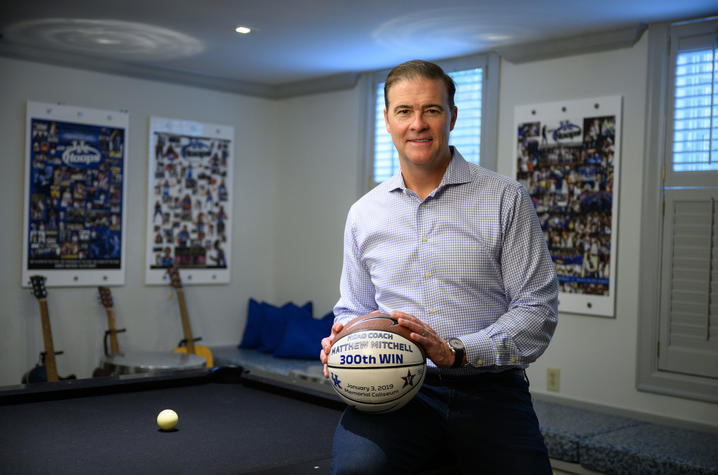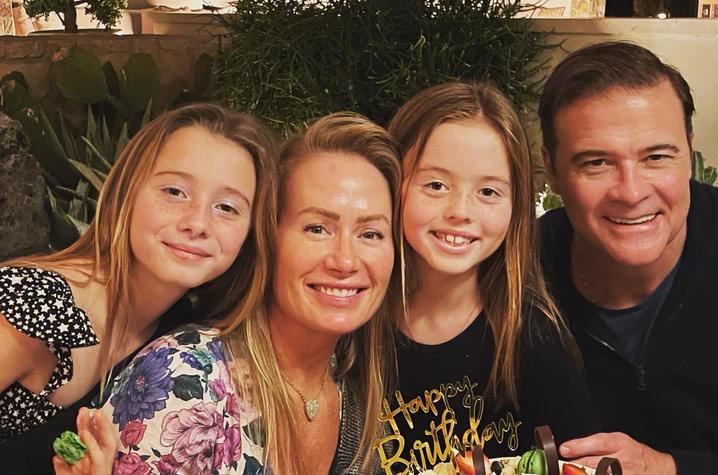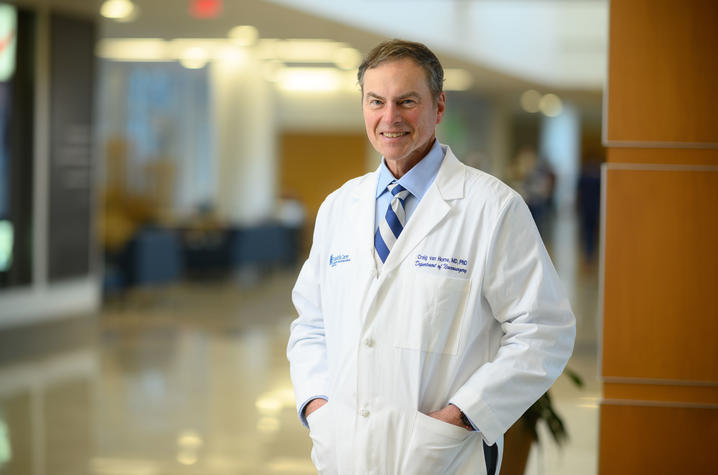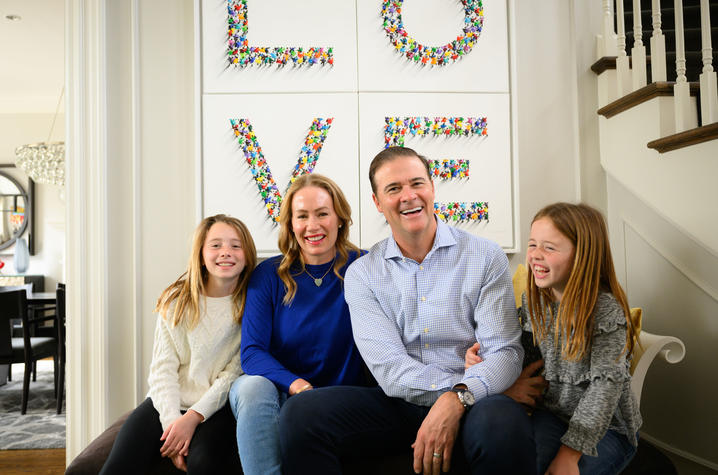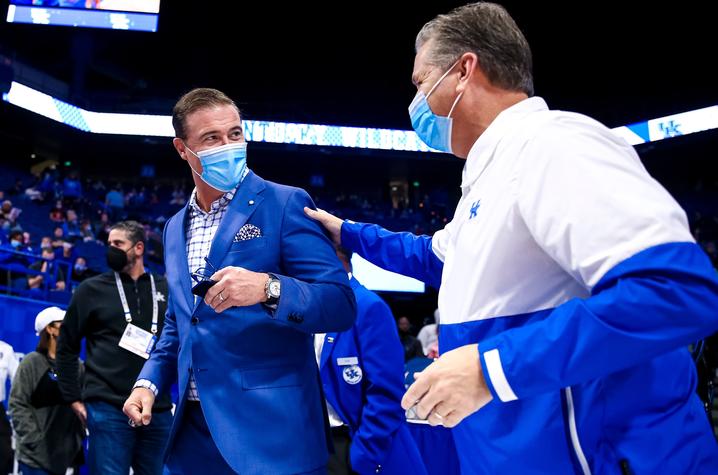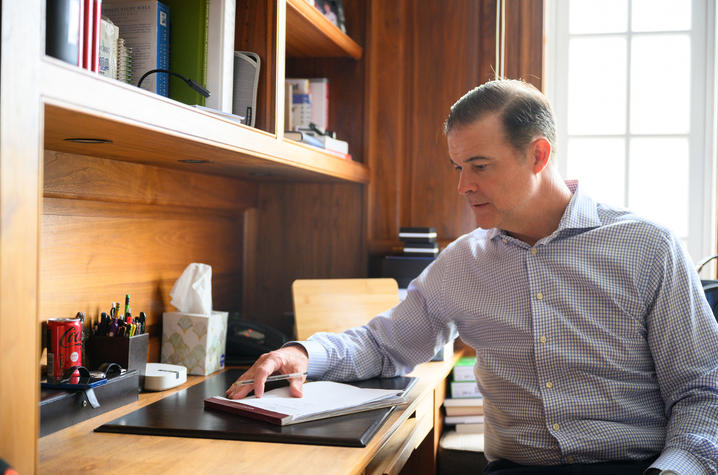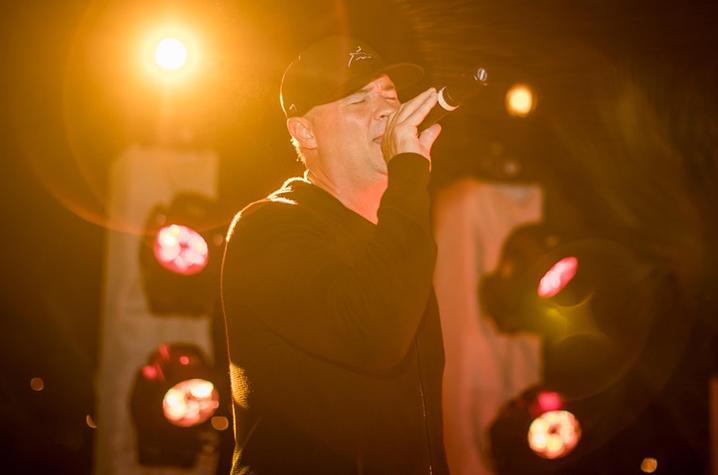Coach Matthew Mitchell commends UK HealthCare after unexpected brain surgery
LEXINGTON, Ky. (Aug. 30, 2022) — “I sure was glad I got it checked out,” said Matthew Mitchell.
The former head coach of the University of Kentucky Women’s Basketball team never imagined he would find himself undergoing brain surgery just hours after a visit to UK HealthCare’s Chandler Emergency Department for a lingering – yet mild – headache.
With plans to head out of town to visit some family, Coach Mitchell said he wanted to simply rule out dehydration or something along those lines.
“I didn’t even think it was something to do with my prior concussion. That is how light it was,” he said.
*****
About two months before getting his headache checked out, the Mitchell family was in Mexico and the COVID-19 pandemic was widening its grip on the world.
“We had traveled there for spring break when COVID hit,” said Mitchell. “We ended up staying down there. We were in a pretty isolated place, so it ended up being a great place to be during the first weeks of the pandemic.”
Coach Mitchell and his family spent a lot of time outside during those first weeks, and while walking on a rocky path, he slipped and fell.
“I hit my head — I knew it was a bad fall,” he said. “But it was that weird early time of COVID and no one knew what was going on. They were saying 'hey, unless it’s life-threatening, don’t come to the hospital'”
Instead, Coach Mitchell scheduled a telehealth appointment with his athletic trainer back in Lexington.
“I had been around concussions a lot in sports, and so we diagnosed that I had a concussion, and I took it easy for a few days,” he said. “Eventually, I felt like I had fully recovered.”
But several weeks later, back in Kentucky, Coach Mitchell realized he’d had a faint headache for a long time. “I would take some ibuprofen and that would sort of knock it out. But it was like clockwork: four hours later, it would come back. It was just severe enough that I said this isn’t right.”
At first, he didn’t connect the headache to his fall, but UK HealthCare emergency medicine physician Brian Adkins, M.D., Coach Mitchell’s friend and neighbor, convinced him to come into the Chandler Emergency Department for some testing.
“I was not thinking that this was a big deal at all,” Coach Mitchell said. “It was not like, oh my head is pounding, I can’t get through the day. Something is wrong with me. It was just enough to make me curious to see what was going on.”
*****
Around 7 o’clock the next morning, Coach Mitchell underwent brain surgery.
“It was not good,” said Mitchell. “It was a whirlwind. It happened so fast. I didn’t really even have time to think about it.”
An MRI revealed a subdural hematoma on the right side of his head. Blood had built up in the layers of tissue surrounding the brain, pressing his brain over to the left side of his skull.
“We don’t scan everybody who has headaches or just isn’t feeling quite right, but when you put it all together with a history of a fall, hitting his head, then it makes it necessary to really take a deeper look and figure out what’s going on,” said Craig van Horne, M.D., Ph.D., co-director of the Brain Restoration Center at UK HealthCare’s Kentucky Neuroscience Institute.
Dr. van Horne determined that due to the size of the subdural hematoma and the fact that it was causing pressure on Mitchell’s brain, that surgical intervention was needed.
Even though weeks had passed between Mitchell’s injury and his scan, van Horne knew the situation was urgent.
“There was no advantage in waiting,” said van Horne. “Things can go downhill very quickly.”
The procedure involved drilling burr holes, roughly the size of a penny, into Coach Mitchell’s skull, allowing the built-up fluid to drain and relieve the pressure around his brain.
“In our field, getting these patients treated is really important before it becomes a severe problem. And had this gotten bigger, it could have presented with a much more serious problem,” said van Horne. “The brain does not heal very well after injury, so it’s very important to protect as much of the brain as possible before things get really bad.”
Despite going from what he thought was a minor headache to brain surgery in a matter of hours, Coach Mitchell says he was surprisingly at ease.
“I was very, very confident in the people who were surrounding me,” said Mitchell. “Anytime you’re going into surgery, I think there’s a little bit of anxiety, but I was so comfortable and so confident in my doctors that it was not as nerve-wracking as you might think.”
*****
Dr. van Horne says the procedure Coach Mitchell underwent is pretty straightforward, but that the recovery can be far more complex due to the intricacies of the brain and its inability to heal quickly.
As Coach Mitchell prepared for his 13th season at the helm of the UK Women’s Basketball program, he had to greatly scale back his day-to-day activity.
“I train pretty hard; I enjoy it for my health and competitiveness. I work with a trainer, lift weights, do yoga, run and all these things,” said Mitchell. “The only activity the doctors wanted me to do was walk. So I took a lot of long walks.”
By mid-September Coach Mitchell was released back to normal activity.
“I had been around so many great doctors at UK HealthCare over my career as a basketball coach, and so I just listened to what they said. I did exactly what they told me to,” said Mitchell.
*****
The time between getting his emergency room visit and recovering from surgery was all a bit of a blur for the two-time SEC Coach of the Year.
“I didn’t have a lot of time to think about it, it was only afterward, that I started kind of researching a little bit on what could have happened and what the possible outcomes were,” said Mitchell. “That kind of stopped me in my tracks a little bit. This was a big deal.”
The coach says he found himself being very reflective after going through this all while also amid the COVID-19 pandemic, which changed life as he knew it.
“It took me out of the office and I was working from home. I was always active and around my family. I worked hard to be a good dad and good husband,” said Mitchell. “But it made me think about how much time my job required and then the surgery really made me think about how short life can be and how short life is.”
Coach Mitchell says his life-threatening experience and recovery, aided by UK HealthCare, “had me examine my place in the world.” After 13 seasons and more than 300 wins, he made the choice to retire from his coaching position. Now that he’s healed and healthy, he’s looking forward to what’s next—including the launch of a leadership development company and entertaining people with the Coach Mitchell Band.
“It just felt like it was really important to move in a different direction — to pour my energy into helping people, but just in a different way,” he said. “I’m very, very blessed to have a loving family and a community that has always really supported me, and they continue to do that. And so I feel very blessed that God has got me in the exact right spot where I’m supposed to be.”
As the state’s flagship, land-grant institution, the University of Kentucky exists to advance the Commonwealth. We do that by preparing the next generation of leaders — placing students at the heart of everything we do — and transforming the lives of Kentuckians through education, research and creative work, service and health care. We pride ourselves on being a catalyst for breakthroughs and a force for healing, a place where ingenuity unfolds. It's all made possible by our people — visionaries, disruptors and pioneers — who make up 200 academic programs, a $476.5 million research and development enterprise and a world-class medical center, all on one campus.





